Can Alcohol Cause Autism?

Understanding the Current Evidence on Alcohol and Autism
The question of whether alcohol consumption during pregnancy causes autism spectrum disorder (ASD) remains a topic of ongoing scientific investigation and public concern. While research has established clear risks related to alcohol exposure, such as fetal alcohol spectrum disorders (FASD), its specific role in the development of ASD is less certain. This article explores the latest scientific findings, addresses misconceptions, and discusses the implications for pregnant women and individuals with ASD.
Examining Prenatal Alcohol Exposure and Autism Risk
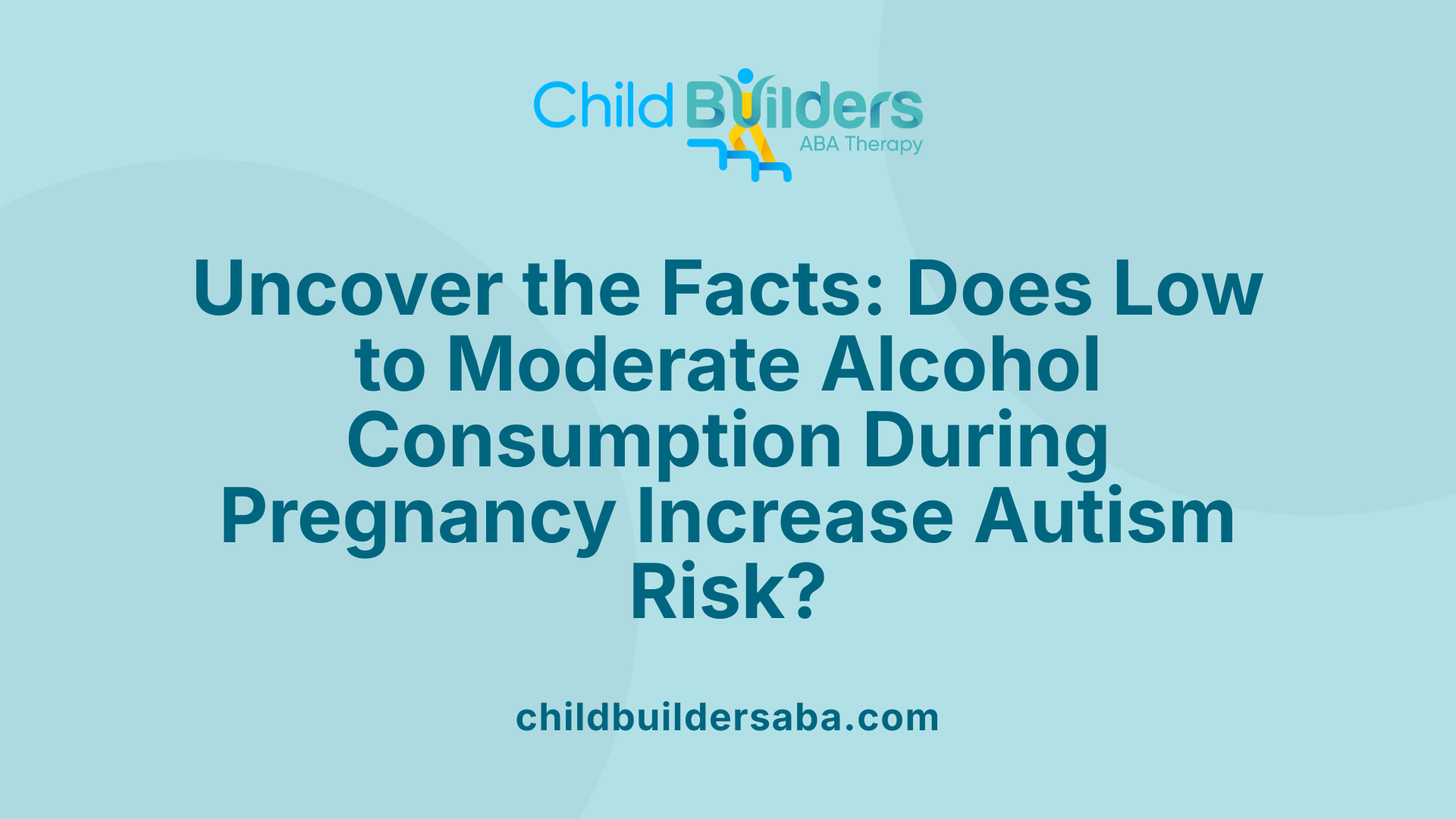
What does research say about maternal alcohol use during preconception and pregnancy?
Recent large-scale studies, such as one analyzing data from the Millennium Cohort Study involving over 18,000 mother–child pairs, have not found a significant link between low to moderate alcohol intake during pregnancy and the occurrence of autism spectrum disorder (ASD) in children. Specifically, these studies show that women who consumed light or moderate amounts of alcohol (up to 2 drinks per week) during pregnancy did not increase the risk of having a child with ASD.
In fact, the data suggest that mothers of children diagnosed with ASD or developmental delays were less likely to report alcohol use during pregnancy compared to mothers of children without these conditions. This inverse relationship is most likely due to biases, residual confounding, or other unmeasured factors rather than a protective effect of alcohol.
However, due to a limited number of heavy drinking cases within the studies, the association between high alcohol consumption and ASD could not be firmly established. Overall, evidence indicates that low-level alcohol consumption during pregnancy does not pose a significant risk of ASD in offspring.
Current Scientific Perspectives on Alcohol and ASD
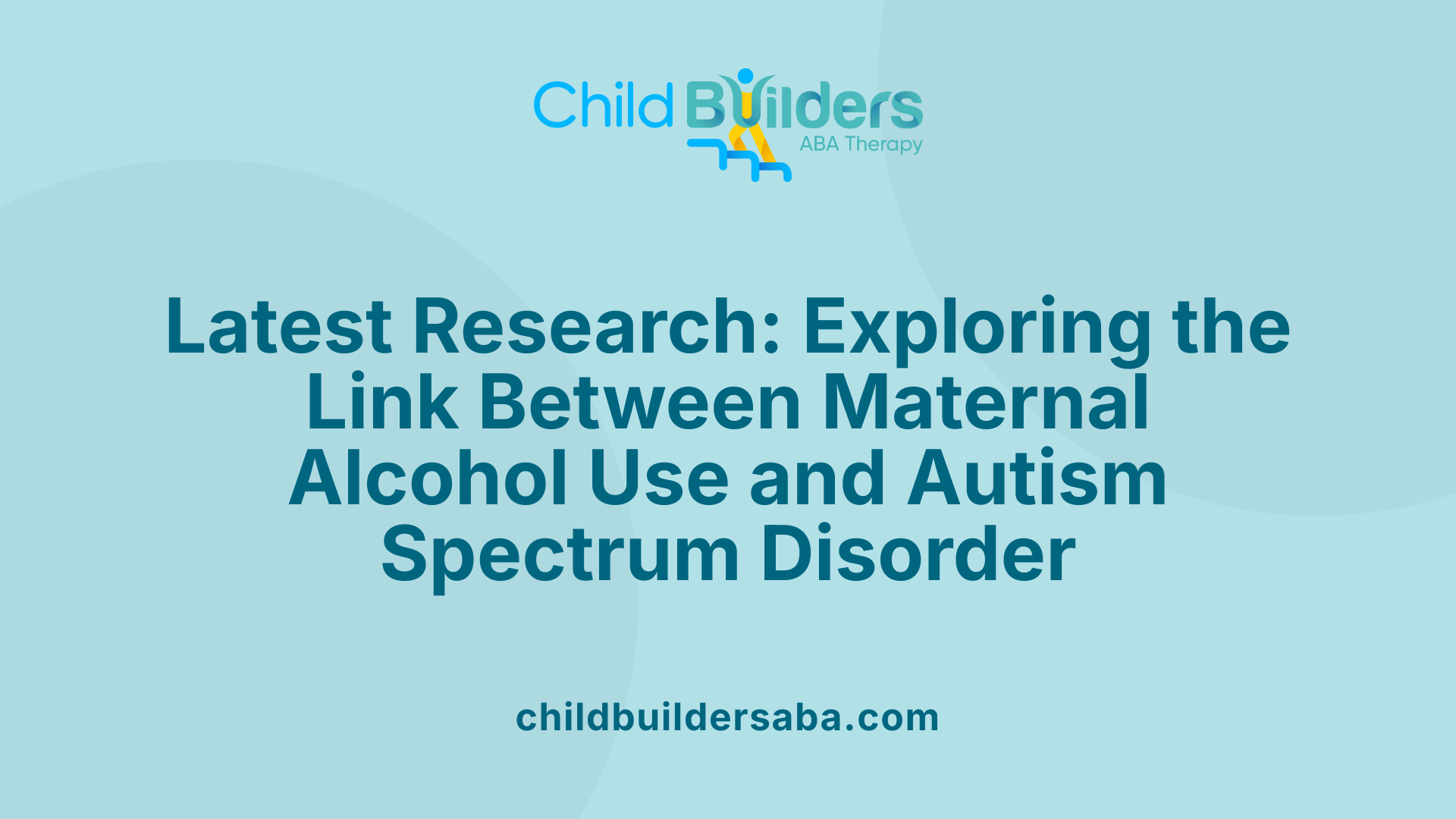
What have large cohort studies revealed about maternal alcohol use and autism risk?
Recent research utilizing large datasets, such as the Millennium Cohort Study involving over 18,000 mother-child pairs, has provided valuable insights into the relationship between alcohol consumption during pregnancy and the development of autism spectrum disorder (ASD) in children. Findings consistently show no statistically significant link between low, moderate, or even heavy alcohol use during pregnancy and increased ASD risk. In particular, studies have found no evidence that light or moderate drinking (up to 2 drinks per week) contributes to the development of ASD, even after accounting for later confounding factors.
Interestingly, some data have pointed to an inverse association — suggesting that children of women who consumed small amounts of alcohol might have a slightly lower risk of ASD. However, experts caution that these findings are likely influenced by biases, residual confounding, or unmeasured variables, rather than indicating any protective effect of alcohol.
| Study Type | Sample Size | Major Findings | Notes |
|---|---|---|---|
| Cohort Study | 18,168 mother-child pairs | No significant link between alcohol during pregnancy and ASD | Adjusted for confounders |
| Cross-sectional | National survey data | Inverse association with moderate alcohol use | Likely bias or confounding |
What do these findings mean concerning alcohol consumption and ASD?
The evidence base suggests that consuming small or moderate amounts of alcohol during pregnancy is not directly associated with increased autism risk. Nonetheless, too many variables and the observational nature of the studies mean conclusions must be drawn cautiously. As the study authors emphasize, these inverse associations are probably due to biases or other unmeasured factors and do not indicate that alcohol has a protective effect.
Why is abstinence during pregnancy still advised?
Despite the lack of evidence linking low-dose alcohol with ASD specifically, health authorities worldwide advise complete abstinence during pregnancy. This recommendation stems from well-established risks of alcohol to fetal development, including fetal alcohol syndrome (FAS), which involves physical abnormalities, intellectual disabilities, and behavioral problems.
Alcohol can affect brain development broadly, impairing cognitive functions and leading to issues such as ADHD, anxiety, and impulsivity, which have been more clearly associated with prenatal alcohol exposure in the broader literature. Because there is no safe amount of alcohol during pregnancy, avoiding it altogether remains the safest choice for fetal health.
How does alcohol use relate to autistic individuals and their coping strategies?
Within the autistic community, alcohol may sometimes play a role as a coping mechanism. Some autistic adults use alcohol temporarily to manage anxiety, sensory overload, or difficulties related to social interactions. In certain cases, alcohol might mask some autistic traits, complicating diagnosis and understanding of individual needs.
Research indicates that sensory processing difficulties are prevalent in ASD and are associated with higher alcohol use. Autistic individuals with sensory sensitivities or seeking behaviors may drink to modulate their senses or reduce discomfort. Nonetheless, relying on alcohol as a coping tool can carry risks, emphasizing the importance of tailored support approaches, including adapted cognitive-behavioral therapy, to promote healthier management strategies.
Final takeaways
Overall, the current scientific perspective supports that low to moderate drinking during pregnancy does not increase ASD risk, but abstinence remains the best recommendation to prevent other serious developmental issues. For autistic individuals, understanding their sensory needs and seeking appropriate therapies can help reduce reliance on alcohol and improve quality of life.
| Aspect | Findings | Implications |
|---|---|---|
| Research Evidence | No significant link between pregnancy alcohol and ASD; inverse associations likely bias | No need for concern about low/medium alcohol during pregnancy in relation to ASD |
| Risks of Alcohol During Pregnancy | Known to cause fetal alcohol syndrome and broadly affect neurodevelopment | Abstain during pregnancy to prevent physical, intellectual, and behavioral issues |
| Autistic Adults & Alcohol | Used as a coping mechanism; associated with sensory processing issues | Healthcare support should address underlying needs, not just substance use |
| Recommendations | No safe level of alcohol during pregnancy; abstain for fetal health | Healthcare providers should reinforce abstinence and support affected individuals |
Understanding the Causes of Autism Spectrum Disorder
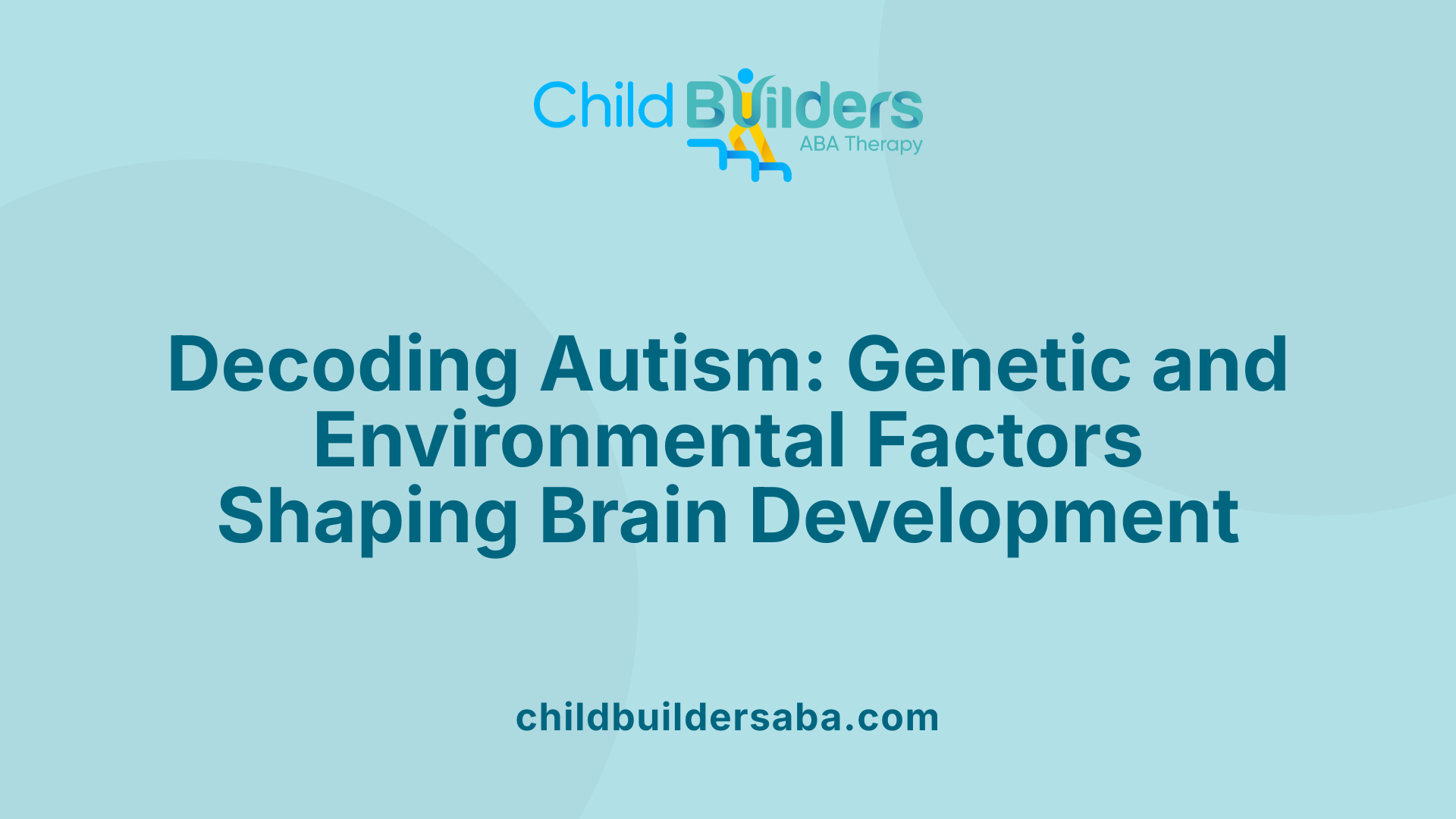
What are the main causes of autism spectrum disorder?
Autism spectrum disorder (ASD) results from a complex web of genetic and environmental influences that affect how the brain develops. Scientists have identified numerous genes related to neural communication, brain structure, and function that, when affected, can increase the likelihood of ASD. Some genetic syndromes are also known to contribute to autism risk.
Environmental factors play a significant role alongside genetics. These include advanced parental age at the time of conception, exposure to toxins like pesticides and air pollution during pregnancy, maternal health issues, and complications during birth. Although research continues, many of these factors are considered to increase risk rather than directly cause autism.
Early brain imaging studies reveal differences in key regions such as the amygdala and corpus callosum, which are involved in emotion regulation and communication. However, no single cause or factor has been identified as the definitive trigger.
It is important to highlight that mainstream scientific consensus has firmly dismissed any links between vaccines and the development of ASD. Multiple large-scale studies have shown that vaccines do not increase autism risk, underscoring that the origins of ASD are multifaceted.
In summary, autism is best understood as a combination of genetic predispositions and environmental exposures that influence early brain development, rather than a result of any one cause.
| Cause Category | Specific Factors | Notes |
|---|---|---|
| Genetic Factors | Mutations, inherited genes, syndromes | Affect brain structure and communication |
| Prenatal Environment | Exposure to toxins, maternal health | Pesticides, pollution, maternal illnesses |
| Birth and Perinatal Factors | Complications, prematurity | May impact brain development |
| Brain Development | Neural connectivity, brain regions | Differences seen in imaging studies |
| Other Factors | Parental age, socioeconomic status | Potential influences but less conclusive |
This overview highlights the ongoing research efforts to untangle the origins of ASD, emphasizing the importance of both genetic and environmental considerations.
Fetal Alcohol Syndrome and Its Relationship to ASD
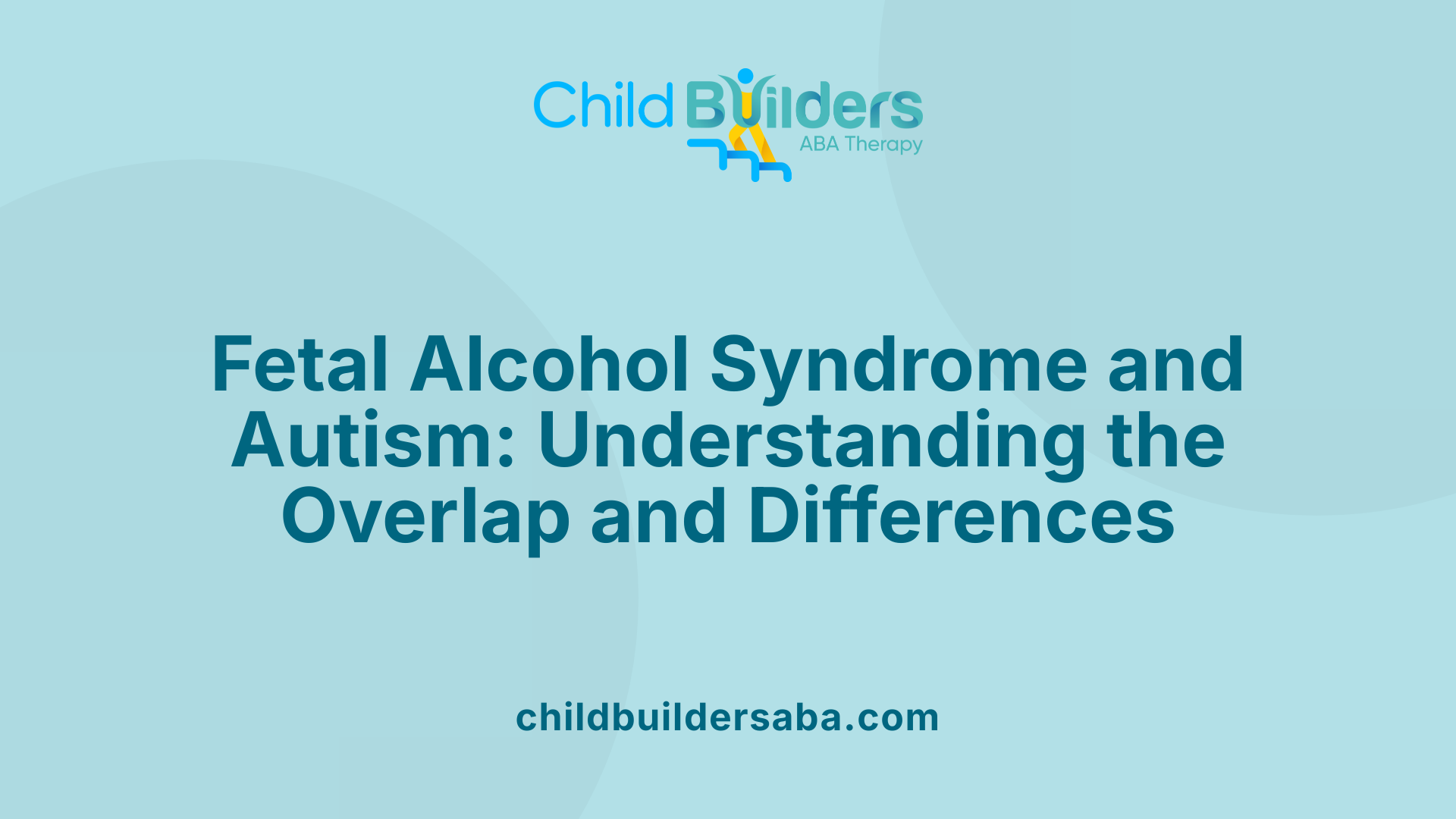
What is fetal alcohol syndrome and how is it related to autism?
Fetal alcohol syndrome (FAS) is a condition that occurs when a fetus is exposed to alcohol during pregnancy. It is characterized by a range of physical anomalies such as distinct facial features, growth deficiencies, and neurodevelopmental impairments that can affect cognitive and behavioral development.
FAS falls under a broader classification called fetal alcohol spectrum disorders (FASD), which includes a variety of neuropsychological and physical issues stemming from prenatal alcohol exposure. These conditions often involve challenges with social skills, adaptive behaviors, and executive functions.
While FASD and autism spectrum disorder (ASD) are distinct diagnoses, they share some overlapping features. Many individuals with FASD exhibit social difficulties, communication issues, and behavioral problems similar to those seen in ASD.
Research indicates that alcohol exposure during pregnancy may elevate the risk of developing ASD-like traits. Some studies show a higher prevalence of autism spectrum traits among children diagnosed with FASD, suggesting a possible link.
The mechanisms through which alcohol affects neurodevelopment are complex. Alcohol can cause epigenetic modifications—changes in gene expression without altering DNA sequences—that disrupt normal brain development. It can impair neuronal migration, interfere with synapse formation, and alter brain circuitry, which are processes vital for typical social and cognitive development.
Differences and overlaps between FASD and ASD
Despite some overlaps, FASD and ASD are diagnosed based on different criteria.
| Aspect | FASD | ASD | Key Differences |
|---|---|---|---|
| Cause | Prenatal alcohol exposure | Genetic and environmental factors | FASD has identifiable physical markers; ASD primarily behavioral diagnosis |
| Physical features | Often present | Rarely associated | Physical signs help in diagnosis of FASD, not ASD |
| Core symptoms | Neurodevelopmental delays, behavioral issues | Social communication deficits, restricted interests | Overlap occurs in social and behavioral challenges |
| Treatment approaches | Supportive therapies, intervention | Behavioral therapies, speech therapy | Different but may benefit from integrated approaches |
Prevalence of ASD traits in individuals with FASD
Studies show that individuals with FASD may demonstrate a higher number of ASD traits compared to the general population. These include deficits in social interactions, communication challenges, and repetitive behaviors.
This overlap highlights the importance of careful differential diagnosis. Identifying ASD traits in children with FASD can lead to targeted interventions, which improve developmental outcomes.
Understanding the intersection of FASD and ASD underlines the need for awareness among clinicians and parents. Early diagnosis and support can help manage symptoms effectively and improve quality of life.
Additional insights
- Many children with FASD do not meet criteria for ASD but show similar difficulties.
- The co-occurrence complicates diagnosis, since the physical markers of FAS are absent in many ASD cases.
- Interventions tailored for ASD, such as social skills training and behavioral therapy, may benefit children with FASD exhibiting ASD features.
In summary, while FASD and ASD are separate conditions, prenatal alcohol exposure can contribute to neurodevelopmental patterns characteristic of ASD. Continued research is vital to unravel the complex relationship and improve diagnostic and intervention strategies.
Alcohol and Developmental Disorders Other Than Autism
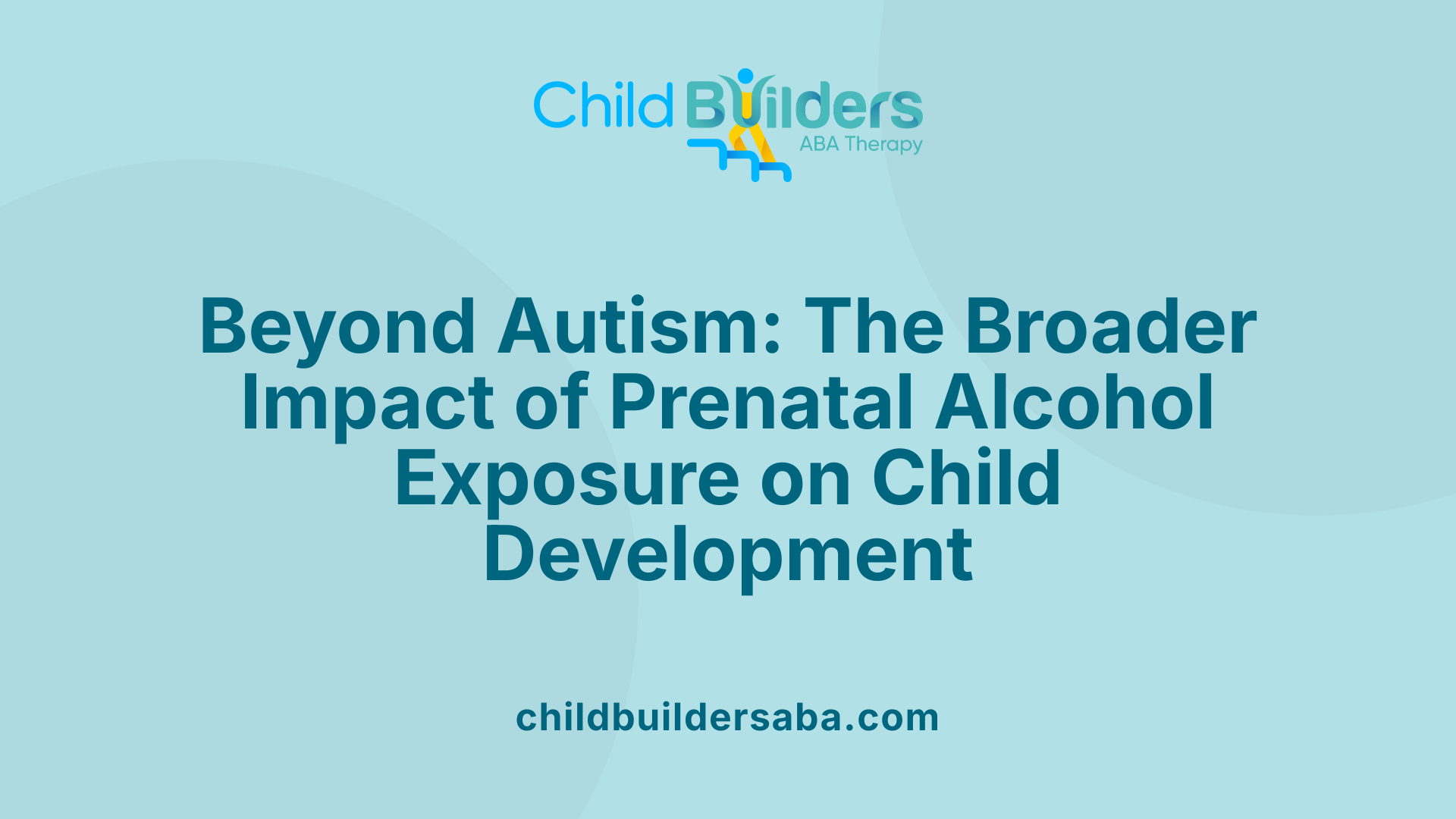
Impact of alcohol on fetal development beyond ASD
Alcohol consumption during pregnancy is well-known for its potential negative effects on fetal development. While much attention is given to autism spectrum disorder (ASD), alcohol may also cause other developmental challenges. Fetal alcohol spectrum disorders (FASD) include a range of lifelong physical, behavioral, and neurodevelopmental problems resulting from prenatal alcohol exposure.
Children affected by FASD often show characteristic facial features, growth restrictions, and brain damage. These physical and neurological impacts can lead to cognitive impairments, learning difficulties, and behavioral issues.
Links between prenatal alcohol and ADHD, Down syndrome
Research indicates that alcohol exposure during pregnancy can contribute to behavioral disorders such as attention deficit hyperactivity disorder (ADHD). Children with FASD may display symptoms similar to ADHD, including hyperactivity, impulsivity, and difficulty sustaining attention.
However, the relationship between prenatal alcohol exposure and conditions like Down syndrome is different. Down syndrome is a genetic disorder caused by the presence of an extra chromosome (trisomy 21), which is unrelated to alcohol consumption. Current scientific evidence does not support a direct link between alcohol intake during pregnancy and the occurrence of Down syndrome.
Risks of alcohol during pregnancy
The primary concern with alcohol use during pregnancy is its potential to interfere with normal fetal brain development. Alcohol crosses the placental barrier and can interfere with cell division, growth, and the development of the central nervous system.
There is no known safe level of alcohol consumption during pregnancy. Even low to moderate drinking may impact fetal growth and neurological outcomes. Heavy alcohol consumption greatly increases the likelihood of FASD and other developmental issues.
Health authorities universally recommend complete abstinence from alcohol during pregnancy to minimize these risks. Despite some misconceptions, current evidence suggests that any amount of alcohol may pose risks to the developing fetus.
| Aspect | Details | Implications |
|---|---|---|
| FASD | Lifelong spectrum of physical, behavioral, and neurodevelopmental issues | Encourage abstinence during pregnancy |
| ADHD | Behavioral symptoms may be linked to prenatal alcohol exposure | Be aware of behavioral signs in children |
| Down syndrome | Genetic condition; not caused by alcohol | Focus on genetic counseling and screening |
| Safe level of alcohol | No safe consumption level during pregnancy | Complete abstinence recommended |
Understanding the broader effects of alcohol during pregnancy emphasizes the importance of avoiding alcohol entirely during gestation. Protecting fetal development can help prevent a range of developmental disorders, ensuring better long-term health outcomes for children.
Genetic, Family, and Social Factors in Autism and Substance Use
Are children of alcoholics more likely to have autism?
Research suggests a potential link between parental alcohol use and the risk of autism spectrum disorder (ASD) in children. Current studies show that children of alcoholics may face a higher likelihood of developing ASD. For example, some research reports a standardized incidence ratio (SIR) of 1.39, indicating a roughly 39% increased risk compared to children of non-alcoholic parents.
Further, if the parent was diagnosed with alcohol use disorder before their child's birth, the risk appears to increase, with an SIR of around 1.46. This suggests that early parental alcohol issues could have a stronger influence on the child's neurodevelopment. One proposed explanation involves biological mechanisms such as increased de novo mutations—new genetic changes that occur spontaneously—and epigenetic modifications, which are changes in gene expression caused by environmental factors like alcohol exposure.
Environmental factors also play a role in influencing autism risk. Families struggling with alcohol problems often experience increased stress, which can negatively affect neurodevelopmental outcomes in children. Stressors within the family environment may exacerbate vulnerabilities, contributing indirectly to ASD development.
Interestingly, preliminary evidence points to the possibility that alcohol consumption might even extend beyond the immediate family to influence future generations. Some findings suggest that grandparental alcohol use could impact autism risk in grandchildren, potentially through epigenetic pathways. These non-genetic barriers involve chemical modifications to DNA that can be passed down, potentially affecting gene expression in descendants.
However, it is important to note that not all studies agree on this connection. Several investigations have found no significant difference in alcohol consumption levels between parents of children with ASD and those of children without ASD. This inconsistency highlights the need for further, more detailed research. Clarifying these relationships can help understand the complex interplay between genetics, environmental factors, and neurodevelopment.
Overall, while there is evidence pointing toward a relationship between parental alcohol use and autism, the mechanisms remain complex and not fully understood. Social, genetic, and environmental influences all intersect, emphasizing the importance of comprehensive approaches to studying and potentially mitigating risks related to family history.
Alcohol and Autism: Causality, Correlations, and Clinical Insights
Is there a proven causal link between alcohol use and autism?
Currently, there is no definitive scientific evidence establishing a direct causal link between alcohol use and autism spectrum disorder (ASD). Multiple studies have examined the potential relationship, but findings indicate primarily correlations rather than causation.
Research based on large cohort data, such as the Millennium Cohort Study involving over 18,000 mother–child pairs from the UK, found no significant association between low to moderate alcohol consumption during pregnancy and ASD risk in children. Even heavy alcohol use showed no clear connection due to limited case numbers. Adjusted analyses considering potential confounding factors, like socioeconomic status and other health variables, further support these findings.
While some research notes a higher prevalence of alcohol use disorder among autistic individuals, this is often attributed to shared genetic factors, co-occurring mental health conditions, or environmental influences, rather than alcohol causing autism. For instance, sensory sensitivities and social difficulties characteristic of ASD may lead some individuals to use alcohol as a coping mechanism, but this is a pattern of use rather than a cause.
Additionally, what is understood is that alcohol use typically begins or increases later in life among those with ASD, often connected to managing anxiety or sensory overload, not in the developmental window when autism occurs. Therefore, current evidence underscores a relationship more rooted in associated factors than in a direct, causal role of alcohol in autism's genesis.
The distinction is crucial for public health guidance. While low to moderate drinking during pregnancy is not supported as harmful regarding ASD, the known risks of alcohol—such as fetal alcohol spectrum disorders—are well-established. These effects are distinct and more clearly linked to developmental impairments beyond autism.
Summary table of research findings:
| Aspect | Findings | Notes |
|---|---|---|
| Pregnancy alcohol use and ASD | No significant link between light/moderate alcohol use and ASD risk | Based on large cohort studies; limited cases for heavy use due to rarity |
| Alcohol use disorder (AUD) in autistic adults | Higher prevalence, possibly due to shared traits or environmental factors | Not causative; may reflect coping or co-occurring conditions |
| Sensory processing issues | Associated with alcohol consumption in autistic adults | Might influence vulnerability but does not imply causation |
| Causality between alcohol and ASD | No proven causal relationship | Current scientific consensus; correlations observed but causation not established |
Correlations versus causation in research
Understanding the difference is critical. Correlations suggest that two factors occur together, but do not prove that one causes the other. In autism research, many observed associations—such as increased alcohol use among some individuals with ASD—are likely influenced by underlying conditions like anxiety, social challenges, or sensory issues.
Experimentally, proving causation requires controlled intervention studies, which are ethically complex in pregnancy and developmental research. The bulk of evidence points to common risk factors or adaptive behaviors rather than direct causative effects.
Alcohol use disorder and autism
Autistic adults often face co-occurring mental health issues, including anxiety, depression, and attention disorders. These conditions can contribute to substance use as a form of self-medication.
Research from various countries, including Sweden and Taiwan, indicates that autistic individuals—particularly those without intellectual disability—are at increased risk of substance use problems. Severity of autism symptoms also influences alcohol use patterns, with some studies showing that individuals with milder ASD features might be more prone to drinking.
Despite this, some studies observe that autistic individuals may engage less in binge drinking than non-autistic peers, possibly due to social disinterest or sensory sensitivity.
Clinical guidance and future directions
While current science supports that alcohol during pregnancy doesn't cause autism, it can lead to other neurodevelopmental issues like fetal alcohol spectrum disorders. Healthcare providers advise abstinence to safeguard fetal health.
For autistic individuals, tailored interventions—such as adapted cognitive-behavioral therapy—can help address both ASD symptoms and substance use issues. Ongoing research continues to unravel the complex interplay between autism and alcohol use to improve intervention strategies.
Understanding these nuances ensures better support for autistic individuals and informs public health policies aimed at reducing risks associated with substance use.
The Role of Support and Intervention for Autistic Individuals and Alcohol Use
How can autism-related alcohol issues be managed or treated?
Support for autistic individuals facing challenges with alcohol use involves tailored therapeutic strategies designed specifically for their needs. One of the most effective approaches is adapted cognitive-behavioral therapy (CBT), which focuses on addressing unique sensory sensitivities, social difficulties, and co-occurring conditions such as anxiety or depression.
Modified CBT programs help clients identify triggers for alcohol use and develop healthier coping mechanisms. These therapies often incorporate visual aids, social skills training, and stress management techniques suited to developmental and sensory profiles of autistic individuals.
Additionally, increasing self-awareness through accurate diagnosis plays a vital role. When individuals understand their autism and related difficulties, they are better equipped to manage behaviors and seek appropriate help.
Educational initiatives are also important, emphasizing social skills development, emotional regulation, and learning alternative strategies to handle overwhelming situations. Support often extends beyond therapy, involving community resources, peer support groups, and healthcare guidance.
By combining these approaches, autistic individuals can achieve a reduction in reliance on alcohol, potentially improving their mental health, social functioning, and overall quality of life.
Looking Forward: Insights and Recommendations
In conclusion, while current scientific evidence does not establish a causal relationship between alcohol use during pregnancy and autism, it underscores the importance of abstaining during pregnancy to prevent FASD and other neurodevelopmental issues. The complex causes of ASD involve genetic, environmental, and developmental factors, with alcohol exposure being only one part of this multifaceted picture. For autistic individuals, alcohol often serves as a coping mechanism, but it can mask symptoms and complicate diagnosis and treatment. Ongoing research continues to explore nuanced relationships and risk factors, emphasizing the need for awareness, prevention, and tailored support. As science advances, clear guidance and supportive interventions remain essential for protecting and enhancing the lives of those affected by ASD and related conditions.
References
- Prenatal Alcohol Exposure in Relation to Autism Spectrum Disorder
- Autism and alcohol - National Autistic Society
- Maternal Alcohol Consumption During Pregnancy and the Risk of ...
- Sensory processing and alcohol use in adults with autism spectrum ...
- Can drugs and alcohol cause autism? - JourneyPure
- Alcohol, Drugs, and Autism: What Risk Do Autistic People Face?
- Does drinking during pregnancy have a link to autism?

























.jpg)











































































